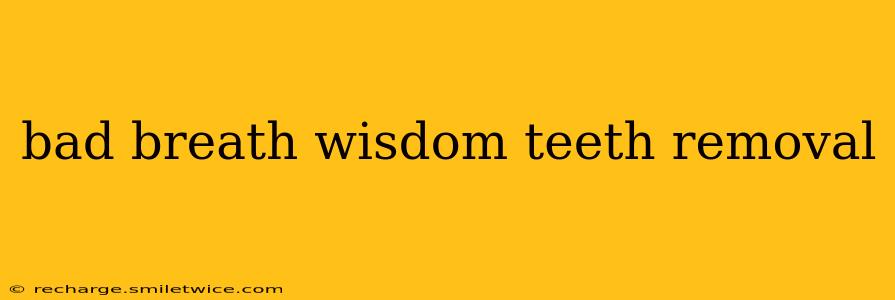Wisdom teeth removal is a common procedure, but it can sometimes lead to unpleasant side effects, one of which is bad breath (halitosis). Understanding the causes, prevention strategies, and treatment options is crucial for a comfortable recovery. This comprehensive guide explores everything you need to know about bad breath following wisdom tooth extraction.
Why Do I Have Bad Breath After Wisdom Tooth Removal?
Several factors contribute to bad breath after wisdom tooth extraction. The surgical site itself is a breeding ground for bacteria, especially in the initial days of healing. Blood clots forming in the extraction sockets can decompose, releasing unpleasant odors. Furthermore, the medications prescribed for pain relief can sometimes contribute to dry mouth (xerostomia), which reduces saliva production, hindering the natural cleansing process of the mouth. Finally, dietary restrictions post-surgery might inadvertently lead to food particles accumulating and decaying in the mouth, further exacerbating the issue.
How Long Does Bad Breath Last After Wisdom Tooth Removal?
The duration of bad breath after wisdom tooth removal varies depending on individual healing rates and oral hygiene practices. Generally, it should subside within a week or two as the extraction sites heal and the initial inflammation decreases. However, persistent bad breath beyond two weeks warrants a check-up with your dentist or oral surgeon.
What if my bad breath persists longer than two weeks?
Persistent bad breath after two weeks could indicate a complication, such as a dry socket (alveolar osteitis), an infection, or another underlying oral health issue. Immediate consultation with your dentist or oral surgeon is essential to address the underlying cause. They can diagnose the problem and provide appropriate treatment.
How Can I Prevent Bad Breath After Wisdom Tooth Removal?
Proactive measures are vital to minimize bad breath after wisdom tooth extraction. Diligent oral hygiene is paramount; however, it's crucial to follow your surgeon's specific post-operative instructions regarding rinsing and brushing. Gentle rinsing with saltwater (as directed) helps clean the extraction sites without disturbing the blood clots. Avoid aggressive brushing or flossing near the extraction sites to prevent dislodging the clots.
What are the best ways to maintain good oral hygiene after wisdom teeth removal?
Maintaining optimal oral hygiene involves gentle brushing and rinsing with a prescribed mouthwash or saltwater solution. Avoid using straws, as suction can dislodge blood clots. Focus on gentle cleaning around the extraction sites, avoiding forceful scrubbing. Staying well-hydrated also assists in saliva production, promoting natural cleansing.
How Can I Treat Bad Breath After Wisdom Tooth Removal?
The primary treatment focuses on maintaining optimal oral hygiene. Regular rinsing with saltwater solutions is often recommended by oral surgeons. Over-the-counter mouthwashes, especially those containing chlorhexidine, can be beneficial, but always consult your dentist before using any new oral care products, especially after surgery. Good hydration is also a significant factor in combating bad breath.
Are there any home remedies to help with bad breath after wisdom tooth extraction?
While home remedies might provide temporary relief, they shouldn't replace professional advice or treatment. Rinsing with saltwater is a commonly suggested home remedy, but it's crucial to follow your surgeon's post-operative instructions. Avoid strong mouthwashes or harsh ingredients that could irritate the surgical sites.
Does Dry Mouth Contribute to Bad Breath After Wisdom Teeth Removal?
Yes, dry mouth is a significant contributor to bad breath after wisdom teeth removal. The reduced saliva production allows bacteria to thrive, leading to unpleasant odors. Staying well-hydrated and using saliva substitutes (if advised by your dentist) can help alleviate dry mouth and combat bad breath.
This article provides general information and should not be considered medical advice. Always consult with your dentist or oral surgeon for personalized guidance and treatment related to wisdom tooth extraction and any resulting complications.
